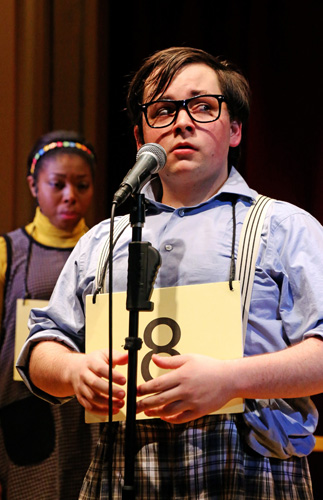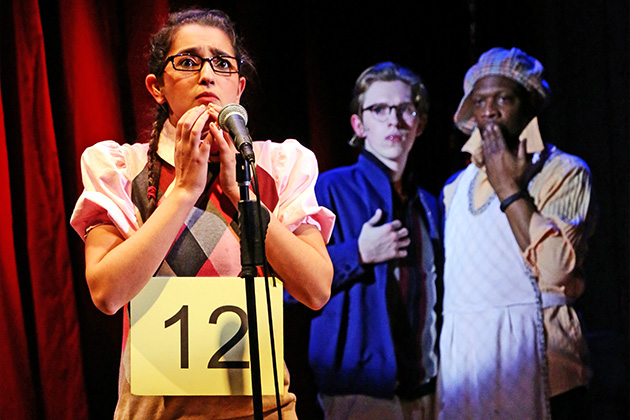
The history of spelling competition goes back to Elizabethan times, when an English schoolmaster wrote a book that included an exercise in which two students squared off against each other to spell words correctly. In the United States, references to a spelling bee can be found as early as 1850, and over time, such competitions led in 1925 to the establishment of the National Spelling Bee.
Today the National Spelling Bee, which in 2014 had 281 spellers competing in the preliminary and final rounds, is televised by the international sports network ESPN. This view of a spelling bee as a competitive entertainment event is part of the success of “The 25th Annual Putnam County Spelling Bee,” the award-winning musical being presented by the Connecticut Repertory Theatre at the Harriet Jorgensen Theatre from Nov. 20 to Dec. 7.
As the characters move through the backstory of their lives in flashbacks during the spelling bee, the theme of competition is ever-present in the setting – a school gymnasium, with its floor lined as a basketball court.
University faculty say that competition in the classroom and on the playing field can provide many lessons to students, although it may have a down side for some.
“The positive side is that competition can enhance success, help us to perform better in some cases, where you may not realize you have the resources inside you,” says Adrienne Macki-Bracconi, assistant professor of dramatic arts in the School of Fine Arts. “The competitive spirit drives you to overcome those obstacles. On the other hand, it can provide anxiety, and cause you to underperform.”
Scott Brown, Board of Trustees Distinguished Professor of Educational Psychology and UConn’s NCAA faculty athletics representative, says competition surfaces in many parts of life – for grades, for jobs, for grant proposals, or for a starting position on an athletic team.
“Competition teaches us about motivation,” Brown says. “It drives us, develops a work ethic, because if you’re competing for something, you’re looking around seeing there are other people working toward that.”
He says learning how to cope with failure is as important a part of the competitive process as success. “As teachers we frequently get in front of students and show them the model problem solver. It’s also important for us to show students –whether undergraduates, K-12, or graduate students – what you do when you fail.”
Joseph Renzulli, director of The National Research Center on the Gifted and Talented and Board of Trustees Distinguished Professor in the Neag School of Education, points to the role of individual choice in deciding to take part in a competition such as a spelling bee.
“Almost all people involved in competitions choose that area; that’s an important part of it,” says Renzulli. “There’s a difference between football and chorus. That’s an element that doesn’t exist in about 98 percent of school learning. You’ve got to go to math class, and you’ve got to compete in math to get a good grade.”
He adds that another part of deciding to participate in specific competition is that an individual feels he or she has not just an interest in a particular subject, but also a strength in that area.

Learning new skills for a competitive activity that can transfer to other areas of life is also important, notes Justin Evanovich ’04 (CLAS), ’06 MA, ’11 Ph.D., assistant clinical professor of educational leadership in the Neag School who was a member of UConn’s 2004 NCAA Men’s Basketball Championship team.
“You’re finding your way through competition, trying to navigate that process and understand yourself,” says Evanovich, who is also managing director of Husky Sport, UConn’s sport-based youth development program in Hartford. In competition, he adds, participants learn to be more self-aware and develop life skills that transfer to everything else they do.
But when it comes to teaching a child how to spell, is a spelling bee beneficial?
“I look at a spelling bee as something that is apart from the acts of learning how to write and to spell,” says Douglas Kaufman, associate professor of curriculum and instruction in the Neag School and a specialist in reading and writing instruction. “You train and train to do something nobody else in the world can do. But in terms of the actual education of children it’s peripheral, in my mind.”
Kaufman says competitive spellers can be viewed like athletes training for a sport. They learn rules, the nuances of language, and the etymology of specific languages.
“But it’s not something we would bring in to the classes in order to make kids better learners,” he says. “We’re looking at spelling as a convention, which is the concept that we all have an agreed upon way of expressing something. Teaching spelling in its own right, decontextualized from the act of making meaning, is not only ineffective, it’s sometimes counterproductive because kids begin to equate spelling with writing. Spelling is at the service of writing, it’s not the be-all and end-all.”
That is why it is helpful for a competitive speller to ask for how a word is used in a sentence: it can be helpful in trying to spell an unfamiliar word. At that moment, Kaufman says, the visual component of writing and spelling comes into play.
“From what kids tell me, they’re looking at the sentence on a little screen in their head so they can see it,” he says. “That context is really important if you’ve been going over words and sentences and you understand the provenance of these words.”
Kaufman agrees that, like athletes, competitive spellers can benefit greatly from their preparation for a spelling bee.
“You have to go in recognizing that complete failure is a viable outcome. If you accept that, you can just plunge in. If you are totally afraid of failing, you’re not ever going to attempt it,” says Kaufman, who competed as a college soccer player. “It’s a cliché, but I think that a lot of joy is in the journey, pushing yourself to the total limit and seeing how far you can go. I don’t expect any of these great spellers to become famous novelists, but they have developed a skill set, an attitude, motivation to overcome real struggle, which will serve them across several venues in their lives.”
For more information about the CRT production of “The 25th Annual Putnam County Spelling Bee” and for tickets go to the CRT website.



